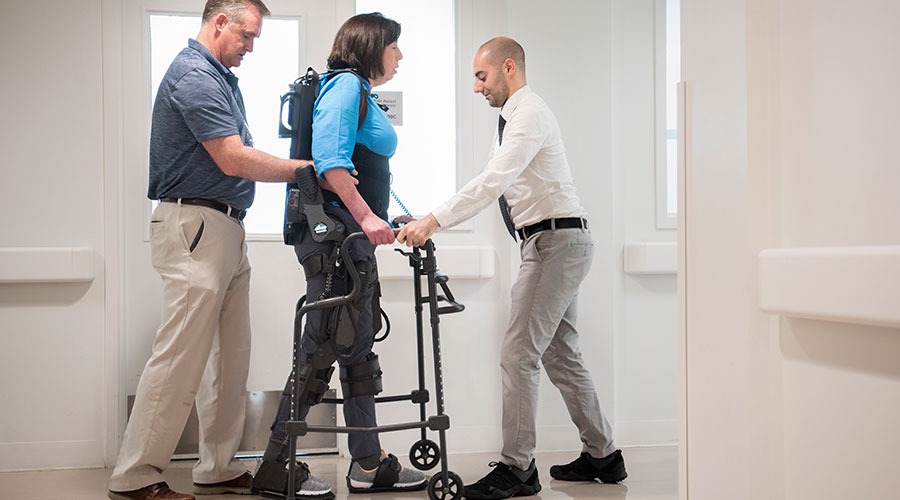Neurological conditions such as stroke, traumatic brain injury, multiple sclerosis, and Parkinson’s disease can significantly impact an individual’s quality of life. These conditions often result in impaired mobility, muscle weakness, balance issues, and difficulties with daily activities. However, through the power of neuro rehabilitation, individuals can regain lost function and improve their overall well-being. In this blog, we will explore the transformative effects of neuro rehabilitation physiotherapy and delve into the various techniques and options available to aid recovery. Whether you choose to seek treatment at a neuro rehabilitation center or practice neuro physiotherapy at home, this guide will empower you to take control of your rehabilitation journey.
Understanding Neuro Rehabilitation
Neuro rehabilitation is a multidisciplinary approach that aims to restore, compensate for, or adapt to the changes caused by neurological conditions. It focuses on improving physical, cognitive, and emotional functions to enhance an individual’s independence and quality of life. Neuro rehabilitation physiotherapy, in particular, plays a crucial role in the recovery process.
Benefits of Neuro Physiotherapy
Neuro physiotherapy offers a multitude of benefits for individuals with neurological conditions. Here are some of the key advantages:
1. Improved Physical Function: Neuro physiotherapy focuses on enhancing physical abilities such as muscle strength, flexibility, balance, coordination, and range of motion. Through targeted neuro physiotherapy techniques and exercises, individuals can regain lost function, improve their ability to perform daily activities, and enhance their overall mobility.
2. Increased Independence: By addressing impairments and working towards specific goals, neuro physiotherapy empowers individuals to become more independent in their daily lives. It helps them regain the confidence and skills necessary to perform tasks such as walking, dressing, bathing, and other essential activities.
3. Enhanced Quality of Life: Neurological conditions can significantly impact an individual’s quality of life. Neuro physiotherapy aims to improve overall well-being by reducing pain, minimizing limitations, and increasing participation in social and recreational activities. It allows individuals to regain control over their lives and engage in activities they enjoy.
4. Prevention of Secondary Complications: Neuro physiotherapy helps prevent secondary complications that may arise from neurological conditions, such as muscle contractures, joint stiffness, and pressure sores. Through exercise, stretching, and postural training, it promotes optimal physical health and reduces the risk of further complications.
5. Facilitation of Neuroplasticity: Neuro physiotherapy harnesses the brain’s remarkable ability to adapt and rewire itself, known as neuroplasticity. By engaging in targeted exercises and techniques, individuals stimulate neural pathways, strengthen connections, and promote functional recovery.
6. Emotional and Psychological Support: Neuro physiotherapy provides emotional and psychological support, addressing the mental health aspects of living with a neurological condition. Therapists offer encouragement, motivation, and coping strategies, helping individuals manage anxiety, depression, and emotional challenges related to their condition.
7. Personalized Treatment Approach: Each individual’s needs and goals are unique. Neuro physiotherapy offers personalized treatment plans tailored to address specific impairments and limitations. This individualized approach ensures that the therapy is focused and effective, maximizing the potential for recovery.

Neuro Physiotherapy Techniques
1. Task-Specific Training: This technique involves practicing specific tasks relevant to the individual’s daily life, such as getting up from a chair, climbing stairs, or reaching for objects. By repeatedly performing these tasks, the brain can rewire itself, improving motor control and coordination.
2. Balance Training: Balance issues are common among individuals with neurological conditions. Neuro physiotherapists employ various neurological physiotherapy exercises, such as standing on one leg, walking on uneven surfaces, or using stability balls, to improve balance and prevent falls.
3. Strength and Endurance Training: Weakness in the affected muscles is a common challenge in neuro rehabilitation. Targeted strength and endurance exercises, including resistance training and aerobic activities, help improve muscle function, increase stamina, and enhance overall physical capacity.
4. Proprioceptive Training: Proprioception refers to the body’s ability to sense its position and movement. Impairments in proprioception can affect coordination and balance. Neuro physiotherapists use techniques like balance boards, vibration platforms, and sensory integration exercises to enhance proprioceptive awareness.
Conclusion
Neuro rehabilitation physio holds immense power in helping individuals reclaim their brain function and regain independence. Whether seeking treatment at any of the good neuro rehabilitation centers or practicing neuro physiotherapy exercises at home, individuals can unlock their potential for recovery. By employing a combination of techniques, embracing technology, adopting a holistic approach, and cultivating a positive mindset, individuals can embark on a transformative journey towards reclaiming their brain and achieving a better quality of life. Remember, with dedication, support, and the guidance of skilled professionals, the power to reclaim your brain lies within your reach.
Frequently Asked Questions
1. What is neuro rehabilitation?
Neuro rehabilitation is a multidisciplinary approach that aims to restore, compensate for, or adapt to the changes caused by neurological conditions.
2. How does neuro physiotherapy help in the recovery process?
Neuro physiotherapy plays a crucial role in the recovery process by improving physical, cognitive, and emotional function, mobility, and overall well-being. It uses targeted exercises and techniques to enhance muscle strength, balance, coordination, and range of motion.
3. What are the benefits of neuro physiotherapy?
Neuro physiotherapy offers several benefits, including improved physical function, increased independence in daily activities, enhanced quality of life, prevention of secondary complications, facilitation of neuroplasticity, and emotional and psychological support.
4. Can neuro physiotherapy be done at home?
Yes, neuro physiotherapy exercises can be performed at home with the guidance of a qualified therapist.
5. What are some neuro physiotherapy techniques used?
Neuro physiotherapy techniques include task-specific training, which involves practicing daily life tasks; balance training to improve stability; strength and endurance training to enhance muscle function and stamina; and proprioceptive training to improve coordination and balance.
We are India’s first comprehensive continuum care provider. We provide multidisciplinary out of hospital care to acute and post-acute and chronically ill patients at our critical care facilities and your home.


